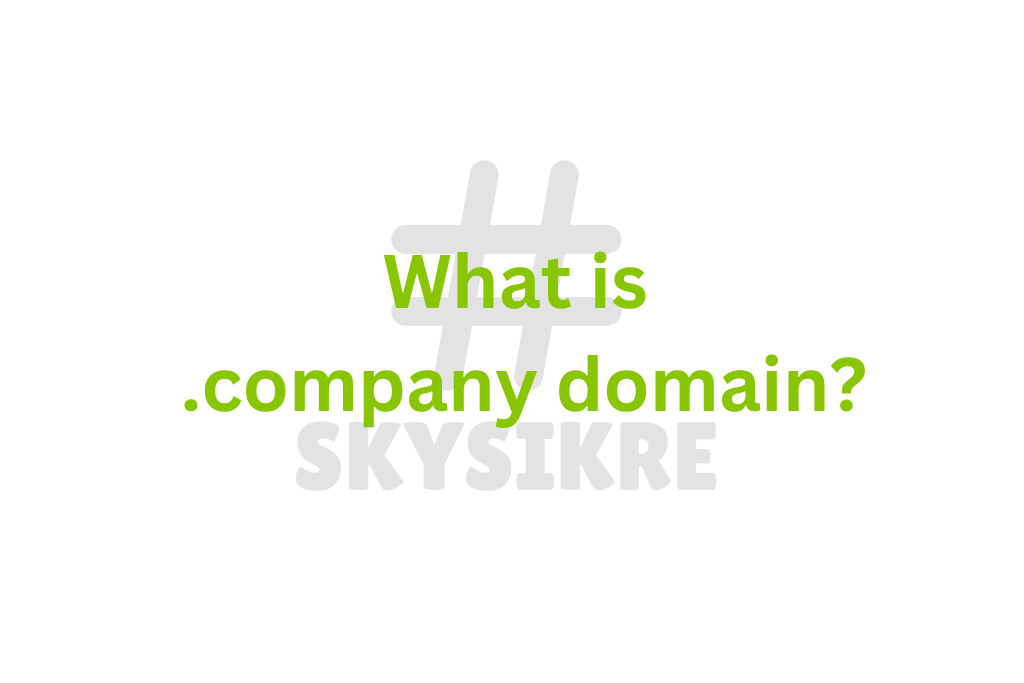Understanding the .company Domain
The .company domain is a specialized top-level domain (TLD) that signifies a digital presence specifically targeting businesses and organizations. This domain extension is designed to clearly convey the commercial nature of a website, making it an appealing option for both startups and established companies alike. Unlike more generic domains, such as .com or .net, which are versatile and used by various types of online entities, the .company domain distinctly emphasizes a business-centric approach.
Organizations keen to establish an online presence will find that utilizing a .company domain can enhance their branding efforts. It allows businesses to present themselves as legitimate entities in the vast online landscape, helping potential clients and partners to recognize their commercial intent immediately. Moreover, adopting this domain extension can provide an opportunity for companies to secure a relevant and memorable web address even when their preferred .com domain is already taken.
One of the key differences between the .company domain and other common extensions lies in its focus. While a .com domain can be used by businesses, nonprofits, and individuals, the .company extension directly denotes commercialization. As such, it permits companies to foster a trustworthy and professional image, reinforcing their commitment to their respective industries. This alignment with business interests can be particularly beneficial in search engine optimization (SEO) strategies, as search engines may favor domain names that match the nature of a user’s inquiry.
In conclusion, the .company domain serves as an effective tool for businesses seeking to strengthen their online identity. By choosing a domain that directly reflects their operational focus, companies can differentiate themselves from competitors and better connect with their target audience. The clarity and simplicity of the .company domain position it as a solid choice for a broad range of organizations aiming to build their brand in the digital sphere.
Benefits of Using a .company Domain
The registration of a .company domain offers numerous advantages that can significantly enhance a business’s online presence. One of the primary benefits is improved brand visibility. A .company domain is straightforward and immediately communicates the nature of the business to potential customers. When users see a .company domain, they can easily understand that the website belongs to a legitimate enterprise, which helps set the stage for positive engagement.
Moreover, adopting a .company domain instills a sense of professionalism. In a digital landscape crowded with various domain extensions, a .company domain stands out due to its clear and concise nature. Businesses that invest in a .company domain signal to their audiences that they are serious about their operation and brand image. This can be particularly beneficial for startups or small enterprises looking to establish credibility in a competitive environment.
Another important advantage is differentiation in the saturated online market. With countless businesses vying for attention, a unique .company domain can help in carving out a distinctive niche. As consumers tend to gravitate towards recognizable and professional-sounding domains, having a .company domain can give businesses the competitive edge they need to attract visitors and convert them into loyal customers.
Additionally, using a .company domain can aid in building trust with clients. In an age where online scams and untrustworthy websites proliferate, a clear and professional domain name serves as a crucial trust signal. When potential clients recognize a business with a .company domain, they are more inclined to engage and transact with that company, as the domain extension implies legitimacy and professionalism.
In summary, registering a .company domain not only enhances brand visibility but also promotes professionalism and differentiation, ultimately contributing to building trust with clients in a competitive marketplace.
How to Register a .company Domain
Registering a .company domain is a straightforward process that typically involves several essential steps. The first step in obtaining a .company domain is selecting a domain registrar. A registrar is an accredited organization that manages the reservation of Internet domain names. It is crucial to choose a reputable registrar, as this provider will handle the critical details of your domain registration, storage, and security.
Once a registrar is selected, the next step is to check the availability of your desired .company domain name. Most registrars offer a search tool that allows potential buyers to enter their chosen domain name and see if it is already taken or if it is available for registration. It is advisable to have a few alternative names in mind, as the specific name you want may be unavailable. Be sure to consider the length, memorability, and relevance of the domain name to your business for optimal branding.
After finding an available .company domain, the registration process can begin. This usually involves providing personal information such as your name, address, and contact details, along with payment for the domain registration fee. The costs associated with registering a .company domain can vary based on the registrar and any additional services you may choose, such as privacy protection or web hosting. It is essential to review these extras, as they can enhance your online presence.
The registration period for most domains is typically one year, but you can often choose to register your .company domain for longer periods as well. Renewing your domain before it expires is crucial to maintaining ownership; otherwise, it may become available for others to register. Thus, monitoring your registration timeline is important for ensuring uninterrupted use of your .company domain.
Who Can Benefit from a .company Domain?
The .company domain is increasingly recognized as a valuable asset for various types of organizations and individuals. One of the primary beneficiaries of this domain extension is startups. As new businesses strive to establish a foothold in competitive markets, having a .company domain effectively communicates their business identity. This specific domain extension helps startups present a professional image to potential investors, customers, and partners, thus enhancing their credibility in the digital landscape.
Established corporations can also leverage a .company domain. For companies looking to diversify their web presence or rebrand, securing a .company domain provides an opportunity to create targeted campaigns and specialized websites. This can be particularly advantageous for large organizations that operate multiple sub-brands, as a .company domain allows for a cohesive identity across different product lines or divisions. It also aids in SEO efforts, improving organic search visibility and driving traffic to their primary site.
Freelancers and sole proprietors are another category that can significantly benefit from adopting a .company domain. This segment often seeks ways to enhance their online presence and distinguish themselves from competitors. By utilizing a .company domain, freelancers can create a professional online portfolio that highlights their skills, services, and value propositions. This can lead to increased client inquiries and opportunities, as a dedicated domain communicates legitimacy and dedication to their craft.
In addition to these groups, various sectors such as tech startups, consulting firms, e-commerce businesses, and service-based professions can find a .company domain to be a suitable choice. It is essential to recognize that the .company domain is highly versatile, catering to a wide range of industries and business models. As businesses continue to adapt to the digital realm, adopting a .company domain can offer a distinct competitive edge and support branding strategies effectively.
SEO Implications of a .company Domain
The choice of a domain extension plays a pivotal role in determining a website’s performance in search engine optimization (SEO). A .company domain, as one of the many specialty domain extensions, can influence various factors that contribute to a site’s search rankings, user perception, and overall click-through rates. Understanding these implications is crucial for businesses contemplating whether to adopt a .company domain.
Firstly, search engines like Google use a myriad of criteria when ranking websites, and domain extensions, while not the sole determining factor, do matter. A .company domain can indicate to search engines that the website represents a business entity, potentially aligning it with commercial intents. Consequently, this specificity may help in ranking for industry-related searches, particularly since users often search for terms accompanied by descriptors like “company” or “business.” A .company domain might resonate with those keywords, reflecting the company’s core identity and increasing relevancy scores.
User perception is another crucial aspect. A .company domain may instill a sense of professionalism and credibility among potential visitors. Users are more likely to trust and interact with a domain that accurately reflects the nature of the business. If visitors perceive a .company domain as more relevant and trustworthy compared to traditional .com domains, this can lead to increased engagement and a higher click-through rate. Moreover, as users become accustomed to a wider range of domain extensions, adopting a .company domain can help a brand stand out in competitive markets.
Finally, employing a .company domain offers advantages for niche marketing and branding strategies. By aligning the domain with the business focus, companies may enhance their brand recognition and ensure a memorable online presence. The ultimate decision, however, should consider a broader SEO strategy encompassing content quality, user experience, and backlinks.
Success Stories: Companies Using .company Domains
As businesses increasingly seek to establish a strong online presence, many have turned to the .company domain as a means to enhance their branding efforts. Numerous organizations have successfully leveraged this domain extension, showcasing its potential for diverse business ventures across various industries.
One notable example is a tech startup that adopted the .company domain to differentiate itself in a saturated market. By choosing a memorable domain, the company was able to communicate its core mission clearly while gaining credibility among potential clients. This strategic move not only helped them develop a distinctive brand identity, but also improved their search engine visibility, ultimately leading to increased traffic and customer acquisition.
Similarly, a consulting firm opted for a .company domain to emphasize its professional services. The choice significantly contributed to their overall marketing strategy, allowing them to present a cohesive brand image that resonated with clients. Feedback from clientele indicated that the .company extension conveyed expertise and stability, leading to improved client trust and satisfaction.
Moreover, a nonprofit organization chose to adopt a .company domain to modernize its digital footprint and attract a broader audience. This decision allowed them to refresh their online narrative while effectively communicating their mission. The .company domain facilitated partnerships with corporate sponsors, enhancing their funding opportunities and ultimately strengthening their programs.
These case studies illustrate the power of utilizing a .company domain for not only branding but also tangible business benefits. Organizations that have implemented this specific domain extension report significant advantages, including enhanced visibility, improved customer engagement, and strengthened brand identity. As more companies recognize the value of the .company domain, it is clear that this extension holds promise for the future landscape of online branding.
Common Misconceptions about .company Domains
As businesses increasingly seek to establish their online presence, the choice of a domain extension plays a crucial role. However, the .company domain extension is often shrouded in misconceptions that can hinder its adoption. One of the most common myths is that .company domains are less effective than traditional options like .com or .org. In reality, .company domains are just as effective for branding and search engine optimization when utilized correctly. Many companies have successfully used this extension to create a distinctive online identity that resonates with their audience.
Another prevalent misconception is that .company domains are not accessible or are seen as unprofessional. In contrast, a .company domain can signify a modern, forward-thinking business. The growing acceptance of a wide variety of domain extensions by consumers makes .company a viable choice for companies seeking to differentiate themselves in saturated markets. Additionally, the domain’s accessibility is on par with traditional extensions. Registration processes have become streamlined, allowing businesses of all sizes to acquire their desired .company domain with ease.
Some business owners express concerns about the suitability of .company domains for various industry sectors. However, .company domains are versatile and applicable across multiple sectors, not limited to traditional industries. They can be utilized by startups, established companies, service providers, and more. This extension lends itself to innovative branding strategies that can effectively communicate the nature of the business. Rather than conforming to conventional domain choices, businesses can leverage the .company extension to enhance their unique brand identity.
Ultimately, dispelling these misconceptions can empower businesses to consider .company domains as a legitimate option. By embracing the potential of .company, companies can establish a meaningful and memorable online presence that reflects their vision and values.
Future of .company Domains
The digital landscape is continuously evolving, and as businesses increasingly seek to establish their online presence, the .company domain is likely to gain significant traction. Over the next few years, trends indicate a shift towards more descriptive and specific domain names. This shift is caused in part by businesses wishing to convey their core function succinctly. The .company domain serves this purpose well, as it instantly communicates the nature of the entity behind the website.
In addition to enhancing clarity, the .company domain can add a layer of professionalism that may appeal to potential clients and partners. As more organizations opt for this domain extension, it may eventually foster a perception of legitimacy and trustworthiness. Companies might begin to segment their online portfolios by using .company for corporate-focused initiatives, thereby strengthening their brand identity. This could encourage other businesses to consider adopting similar strategies, amplifying the visibility of .company domains in an increasingly competitive environment.
Furthermore, the rise of digital transformation across industries underscores the importance of adapting to the latest online trends. Businesses recognizing the benefits of a .company domain will likely take proactive steps to integrate this domain into their marketing strategies. This could involve rebranding efforts or the creation of dedicated platforms focused on specific aspects of their services or products. As digital marketing trends shift towards personalization and user experience, companies will need to ensure their online presence aligns with customer expectations, positioning .company domains as essential tools for achieving these goals.
To summarize, the future of .company domains appears promising, driven by evolving business needs and digital habits. As organizations recognize the value of clarity and professionalism offered by this domain extension, it is anticipated that the adoption of .company domains will expand significantly, positioning businesses to navigate the complexities of the modern digital landscape effectively.






